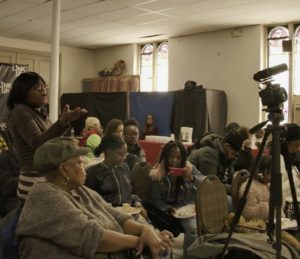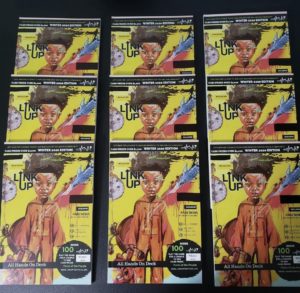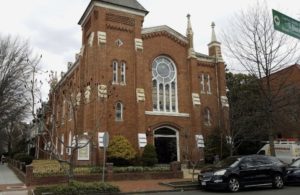In Washington, D.C., activists recently convened a community event at a Black church on Capitol Hill to bring together figures from social movements and spark “a new wave of political organizing,” according to one organizer. It was “all hands on deck” against racism, gentrification and mass incarceration.

The independent city of Washington, D.C., has one of the highest rates of gentrification in the country. A study published last April noted that more than 38 percent of D.C. residents live in areas experiencing rapid gentrification, which have seen their Black population fall by 23 percent and white population increased by 202 percent in the last 20 years. At the same time, D.C. also has a higher incarceration rate than any U.S. state, at 1,153 per 100,000 people. To the activists and community members who gathered at Faith Tabernacle United Holy Church on Feb. 29, this is not a coincidence: they are linked, “part of a larger system that is organized for the benefit of a tiny few at the expense of the many,” LinkUp cofounder Yasmina Mrabet told Liberation News.
“All Hands on Deck” is the first in an event series coordinated between LinkUp and Faith Tabernacle, Mrabet said. “The concept is, it’s ‘all hands on deck,’ from the political front and the community organizing front, from the prisons, from the activist community and the anti-war movement. We want all of that energy to come into this space and to then go out and to bring more, and to spread.”
Folks from the community came together, broke bread, watched a short film titled “The Four Freedoms” by featured artist Frazier Lionel about police brutality and creating community spaces for radical healing, and joined in spirited discussion about the way the issues presented affected the neighborhood.
The activists also invited several local politicians and candidates “to dialogue for solutions in our community,” LinkUp cofounder Delonte Wilkins said. One candidate for an at-large City Council seat, Will Merrifield, is a housing justice lawyer who has represented LinkUp partners at Brookland Manor and Congress Heights in their fight through the District’s court system to stop from being displaced by developers.
“We want this event series to give people the opportunity to see the vision of all of those things coming together and to continue the community conversations about the things that are happening in communities that are rapidly disappearing and today, the theme of police violence, is fitting because the police force are what is used to gentrify communities, they’re the force that makes it happen,” Mirabet noted. “Were it not for the police force it would be very difficult to forcibly displace people from their communities.”

Pulse of the people
The event was also the launch of LinkUp’s new community magazine, which Mrabet said has a theme of “people who don’t have a say,” including struggling community artists, communities targeted for displacement whose voices aren’t be heard, and community members “behind the wall” in the prison system.
One featured piece of artwork in the magazine includes the phrase, “So the last shall be first, and the first last” — a passage from the book of Matthew that was also quoted by Martinican-Algerian revolutionary Frantz Fanon in “The Wretched of the Earth.”
On sale at the event, the magazine will also be distributed throughout the U.S. federal prison system, which is key for the participatory aspects of the magazine: the game “Pulse of the People” and democratic decision-making about how crowdfunded money is distributed.
The game itself is played by choosing answers to different questions drawn from topics of local discussion both political and cultural. Questions might range from “which is the best Kobe sneaker release with Nike?” to “Should we use public money (our tax dollars) to build Social housing or give our money away to private developers?” Points are awarded to those whose answers most closely align with other players, such that the winner is the person who truly has “the pulse of the people.”
“The questions are political, they’re also cultural, but they’re intended to make people have to think,” Mirabet said. “It’s also basically raising people’s consciousness by having them think about things that they may not have otherwise thought about. For example, most people don’t think about the fact that public money is being given away to private developers to build luxury, unaffordable housing that most people can’t access. Most people don’t sit around thinking about how that process works, but through the game we actually discuss that and have people think about that.”

‘A witness on Capitol Hill’
Faith Tabernacle Pastor Frazier White told Liberation News that his vision for his church is “to be a witness on Capitol Hill,” noting that being just blocks from the U.S. Supreme Court, they have no choice but to be connected to issues of justice.
White noted that intense gentrification has dramatically shaped the Capitol Hill neighborhood over the course of his life. According to the Washington Post, in the last 20 years, nearly 75 percent of the low-income population in Capitol Hill and neighboring Kingman Park have disappeared. Today, Faith Tabernacle is just one of two predominantly Black congregations in Capitol Hill.
Gentrification, he said, “equates to diluting.” By scattering his congregants across the city and into Maryland, city planners have greatly frustrated the social role of the Black church as a nexus of survival for its worshipers, their families and friends, and neighborhood residents. Asked to do more with less, White said he receives little support from the D.C. government, who weigh his church’s concerns less because there are “too many Maryland license plates” out front.
Another example he gave is the debate, at times quite heated, about bike lanes and car parking spaces on the district’s roads. “Protection for riders matches who they are,” he said, noting that ire has reached new heights as bike ridership has become more white and more affluent in the neighborhood — and in turn, bicyclists have been increasingly cast as vulnerable and car drivers as the major threat. When the car drivers are displaced Black worshippers returning to their former communities, the debate becomes one of race and class and not simply road safety.
Only through socialism can we truly protect the universal right to housing for all people, and end the racist reign of terror.






